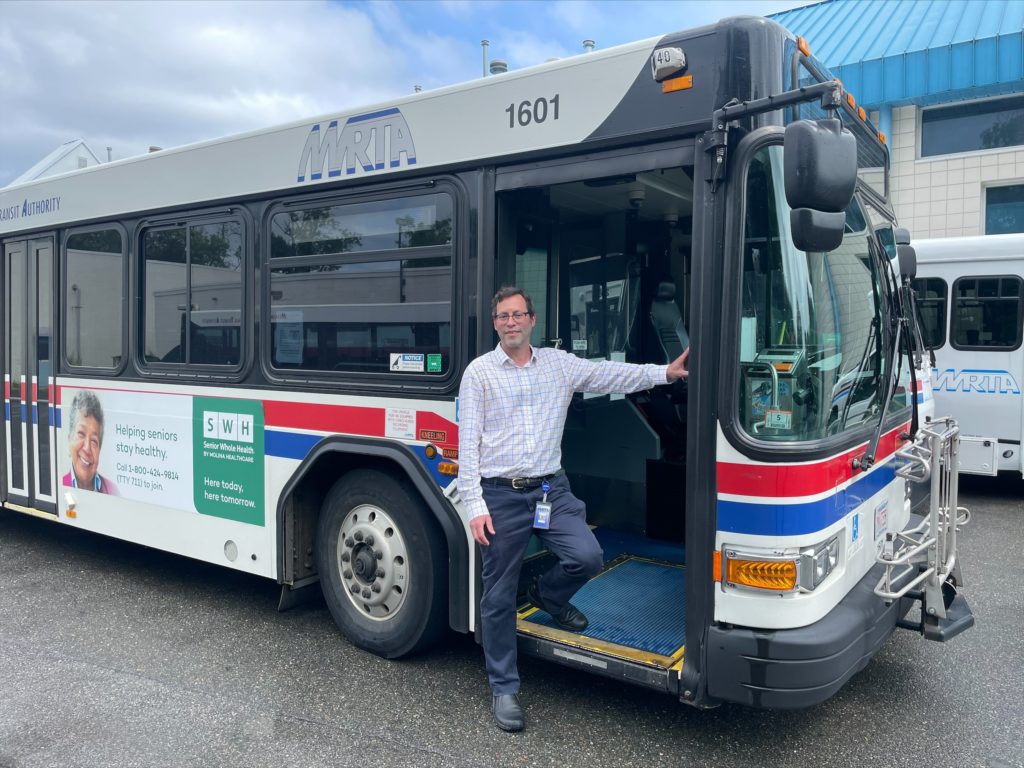
If you see a new face aboard an MVRTA bus, come on over and say ‘hello’—of course if you don’t, he will likely come over to introduce himself to you. Noah S. Berger, the new Administrator for the Merrimack Valley Regional Transit Authority, started on July 31, 2021, and made a public commitment to ride every route in the system. “The best way to understand the mobility needs of people is to talk with them on the bus,” he explains. “Transit systems look much different on a map than they do when you’re on the vehicles, riding in traffic with everybody else.”
Berger succeed long-time Administrator Joe Costanzo, who retired last month after forty-two years at the helm. Berger, who was appointed by the MVRTA Board to the position during its June 22, 2021 meeting, will be only the third Administrator in the history of the MVRTA, which was first established in 1974. The MVRTA serves the northeast corner of Massachusetts with over 1 million miles of scheduled bus routes, as well as demand-response van transportation for seniors and people with disabilities.
Berger comes to MVRTA with almost thirty years of experience in the transit industry, most recently serving as Deputy Administrator for the Cape Cod Regional Transit Authority, based in Hyannis, where he garnered a reputation for creative planning, management and funding of innovative transit projects and programs. He spent fifteen years at the Federal Transit Administration, primarily as Director of Planning and Program Development in the Region 1 Office in Cambridge, MA, where he steered the $1.1 billion annual regional transit grant program from concept through award, and has held leadership positions with CTTransit, the Greater Hartford Transit District, the Boston Foundation, the MBTA Advisory Board, Cambridge Systematics, and Vermont’s Enterprise Community Transportation Project. He even worked for the New York Yankees when he was a teenager, although he concedes that he worked as a vendor, not a ballplayer. “Mostly soda, ice cream or peanuts,” he explains, because “only the seniors guys got to sell hot dogs or beer.” He is originally from New York, where he recalls collecting bus drivers’ autographs from the time he was six years old because, he says, to him “they were superstars.” He is also an exhibited illustrator and oil painter and has Master’s Degrees in City Planning from M.I.T., and Philosophy from the State University of New York.
When asked what the number one thing riders tell him about the service, he is quick to respond that the first thing he hears is how great the service is and how much people appreciate it, immediately followed by a desire for marked bus stops with shelters, like the new MassDOT-funded shelters on River Street near the intersection with Lowell Avenue. MVRTA has historically run as a flag stop system, where riders waive a bus down along the route. “Flag stops work well if you already know the route and know where to get on,” Berger adds, “but can be very intimidating for people who are unfamiliar with the system.” Berger sees the addition of clearly-marked stops as part of a critical visibility campaign to attract new riders to transit. “After COVID,” he explains, “we need to draw new riders to the system—this means reassuring them that transit is a very safe, convenient, reliable, and even enjoyable way to get around.”
MVRTA Spokesperson Niorka Mendez added that “Noah has been in the MVRTA for only three weeks but it feels like he has been part of this family for a long time. He brings a combination of fresh ideas, experience, knowledge, motivation and positive attitude that makes him a great leader. We are very excited to have him on board and we are looking forward to this new journey.”
In addition to riders, Berger and his team are also meeting with leaders of all sixteen MVRTA cities and towns, as well as local community groups, the business community, and drivers, who Berger notes are on the front lines. Berger says that he has a great crew covering all aspects of operating a bus system, and that everyone at MVRTA looks forward to working with the community to deliver the best, most convenient transit possible.